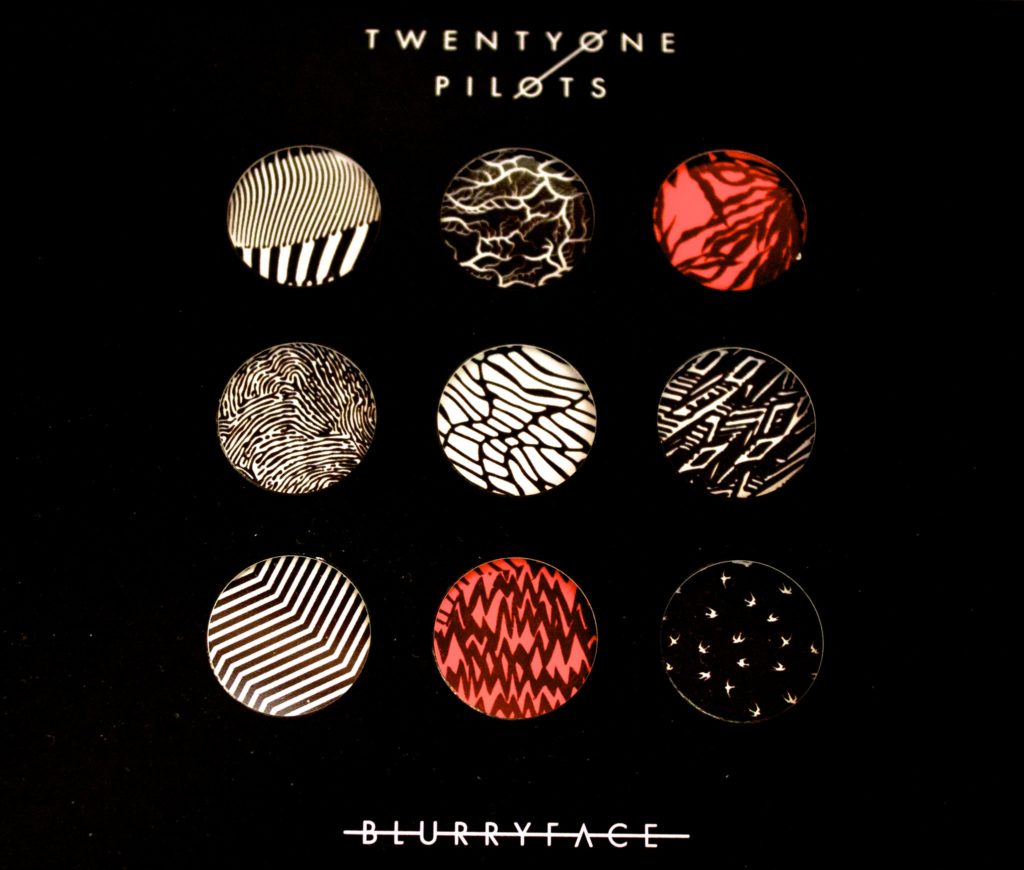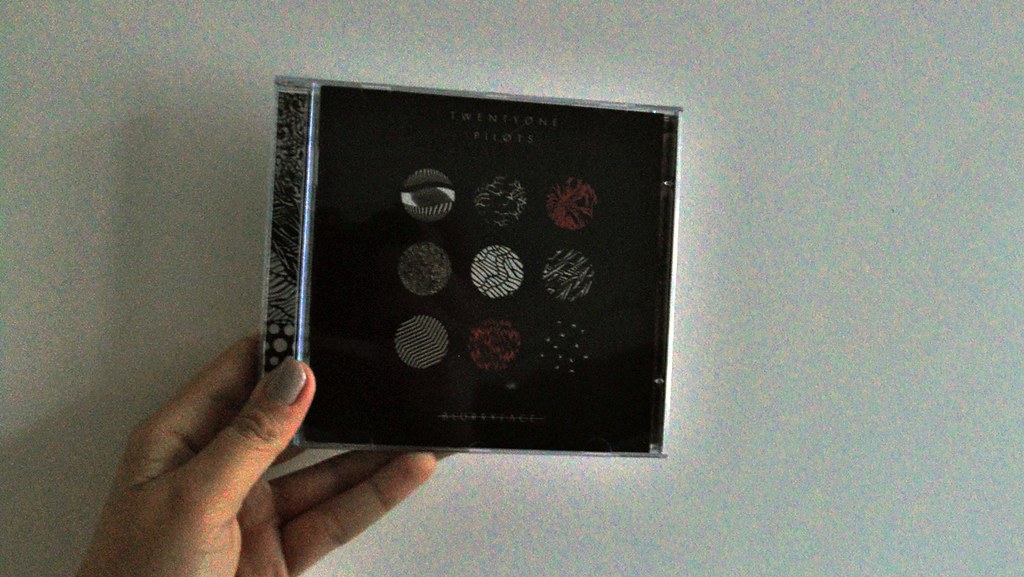On May 17, 2015, Twenty One Pilots’ (TOP) released their album “BLURRYFΛCE.” (Blurryface) wasn’t the first TØP album that I had listened to. Back around 2011, when Tyler Joepsh’s “Can’t Help Falling in Love” cover was virial on Tumblr, was the first time I ever heard him. Then in 2013, I heard “House of Gold” as a suggested song on Google Music, and it was the first time I knew that I was listening to a TØP song.
I’ve loved them since 2013, but “BLURRYFΛCE” in my opinion, is the most essential version of TØP. It highlights both the band’s iconic genre playfulness alongside their religious and philosophical themes. So, with its fifth birthday recently passing, what is a better time to remember its impact than now?

The story of the album’s central character, Blurryface, is indirect. It is more of a lyrical concept than a fully-scripted story, however the story can bring to mind tales such as “Jekyll & Hyde” with its theme of duality.
This album begins with the absolute slap-to-the-face that is “Heavydirtysoul” reaching a rapid pace of 129 beats per minute within the first few words, it is nauseatingly fast and is the fastest rap for TØP. (Beating “Levitate” and “Ode to Sleep” by just a few beats.)
That speed is almost a distraction from the lyrics, which originally was slam poetry from 2013 in which Tyler asks the listener to save his heavy, dirty soul from himself during the repeated chorus. Similar to its swift beat, its music video shows the viewer a car speeding fast and swerving. It is easy to assume that the driver is Blurryface himself.
The car is deteriorating represents Tyler’s mental state. Tyler’s hands and throat are also darkened, this represents Blurry poisoning his music.
The next song is “Stressed Out,” a flashback to the band’s past. Its video shows Tyler and Josh drinking juice pouches and playing on bicycles in a suburban cul-de-sac. Even then, this darkness is on Tyler. The tone shifts and we see Tyler and Josh awaken in a white room surrounded by their family members. They echo Tyler’s lyrics in a deep voice, then everything shifts. Tyler is in a completely blackened room as his eyes turn red and he begins speaking the deep, distorted lines. This is Blurry speaking.
Next is “Ride.” If you had listened to any radio stations in the mid-2010s, you heard “Ride”; however, it’s arguably the weakest song. Its video was filmed in a forest, an important recurring symbol of childhood in TOP lyrics and music videos.
An argument could be made that Blurry is stalking from the trees. Right before the lyric “I’ve been thinking too much. Help me,” Tyler wraps his fingers around his throat. Then, we are greeted with an isolated and snow-covered wearhouse for the video to the song “Fairly Local.”
Josh and Tyler stand back-to-back; as Josh walks away, the camera shows Tyler’s red eyes. This is Blurry’s song. It’s cocky and unlike Tyler’s regular singing style, emphasized with aggressive lyrics such as: “I’m evil to the core, what I shouldn’t do I will… What I wanna save, I’ll kill. Is that who I truly am?”
Tyler is silhouetted behind glass while he talks about fans, showing him to be trapped. It cuts back to Blurry, stumbling drunk with power. Then, it cuts to a red room, where the viewer is unable to tell if Tyler or Blurry is in control. Until the camera shows Tyler’s eyes, he grabs his throat and Blurry’s eyes appear, mocking Tyler’s verse. The lights rapidly switch on and off as the two fight for control of the body. Blurry pulls a dark cloth over their face, until Tyler rips it off. However. He ultimately succumbs to Blurry.
“Tear In My Heart” shows Tyler trying to perform as his mind, Blurry, morphs the world around him. His wife isn’t morphed and he chases her to a restaurant, where she beats the absolute…um…crap out of him. It’s nonsensical and probably a visual representation of how Blurry is making Tyler fear those he loves.
“Lane Boy” starts off intensely by talking about how some of the songs on Blurryface’s namesake album might feel basic and how it’s an uphill battle to create different music in the industry. He lifts a cloth over his face before the rap begins, signaling that Blurry is there. He mentions the kill list from “Ride” and how he’d do anything to protect his brother. He scribbles on two men wearing hazmat suits with a black marker.
It shifts to a concert where waves of fans kneel and the two men in hazmat suits are wearing the words “fame” and “success.” Tyler asks, “Why do I kneel to these concepts? Tempted by control, controlled by temptation. ‘Stay low,’ they say. ‘Stay low’.” He screams and jumps to his feet.
As the music bombastically explodes, he jumps and faces the fans. It cuts to Blurry for a split second, kneeling on the lane. Back onstage, Tyler is frantically rubbing his eye. The cockyness is back as Fame and Success kneel before Tyler, and it can be assumed that Blurry is back in control. The rest of the album is without music videos, relying on lyrics and sound alone for storytelling.
My interpretation of the intro to “The Judge” is that it is Tyler’s prayer to God for a release from Blurry, whom he is referring to as the devil. Soon after this, the song suddenly becomes happy and gospel-like in its tone.
“Doubt” begins dark and pressing, later using the lyrics “shaking hands with the dark parts of my thoughts, no. You are all that I’ve got, no.” The tune is a darker, more desperate prayer. Tyler is pleading with God to remember and save him. He mentions wishing the markings on his skin meant something to him again.
This is the first time I believe he isn’t referring to Blurry’s iconic darkening of his hands and throat, but rather his real life cross tattoo. His relationship with God is strained by the mental struggle he is having and the fear of losing faith is extremely horrifying to him.
“Polarize” talks of splitting oneself in two behind a disguise. Tyler sounds as if he’s losing his mind, screaming “find me.” The chorus asks for help for his friend’s problems. But, he messes up, saying “we have problems,” referring to Blurry and himself. He talks of wanting to have been a better son, and losing his halo, as if he’s already dead.
“We Don’t Believe What’s On TV” talks about the death of dreams and fears of abandonment. Blurry is further twisting the knife of insecurity. “Message Man,” I believe, holds the implication of Tyler explaining his fight with Blurry. He is outright called a loser for hiding in the song. Tyler starts talking about using his music to fight Blurry, directly addressing fans (referred to as “you”) within the song.
“Hometown” feels like a reflection, but of a different sort than “Ride.” Tyler literally asks for his soul to be repaired. I think Tyler is acknowledging that those who have grown up with him don’t understand his struggles. The song talks about abandoning tradition and how the spirits back home are waiting.
“Not Today” feels like the fight between Tyler and Blurry, as Tyler is contemplating sucide by jumping out of his window. “Goner” is Tyler praying before his sucide attempt, attempting one last time to beat Blurry. Judging by how Tyler diminishes at the song’s end, I fear that Blurry won.
That ambiguity is one of the best parts of this album. The fact that the battle has no clear end and is unsatisfying and leaves the listeners waiting more. It’s such a good metaphor for the uphill battle mental illness and is almost upsetting that the listener can’t tell who won. It’s fear inducing that there’s an ambiguity that exists. Yet, it’s perfect.
LeAnne McPherson
Multimedia Specialist & Reporter


